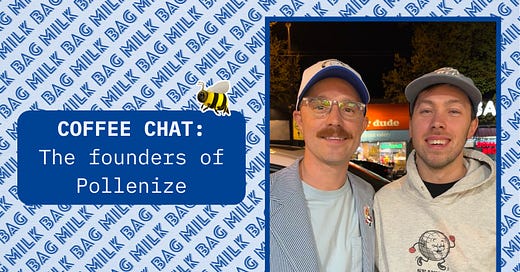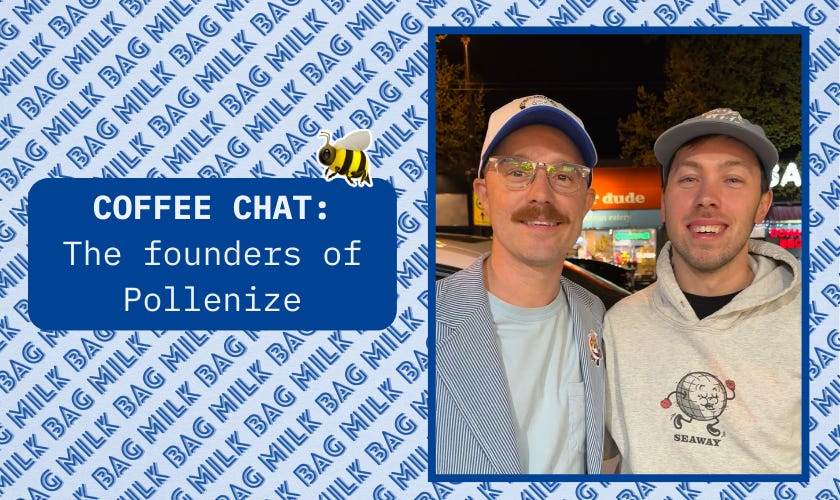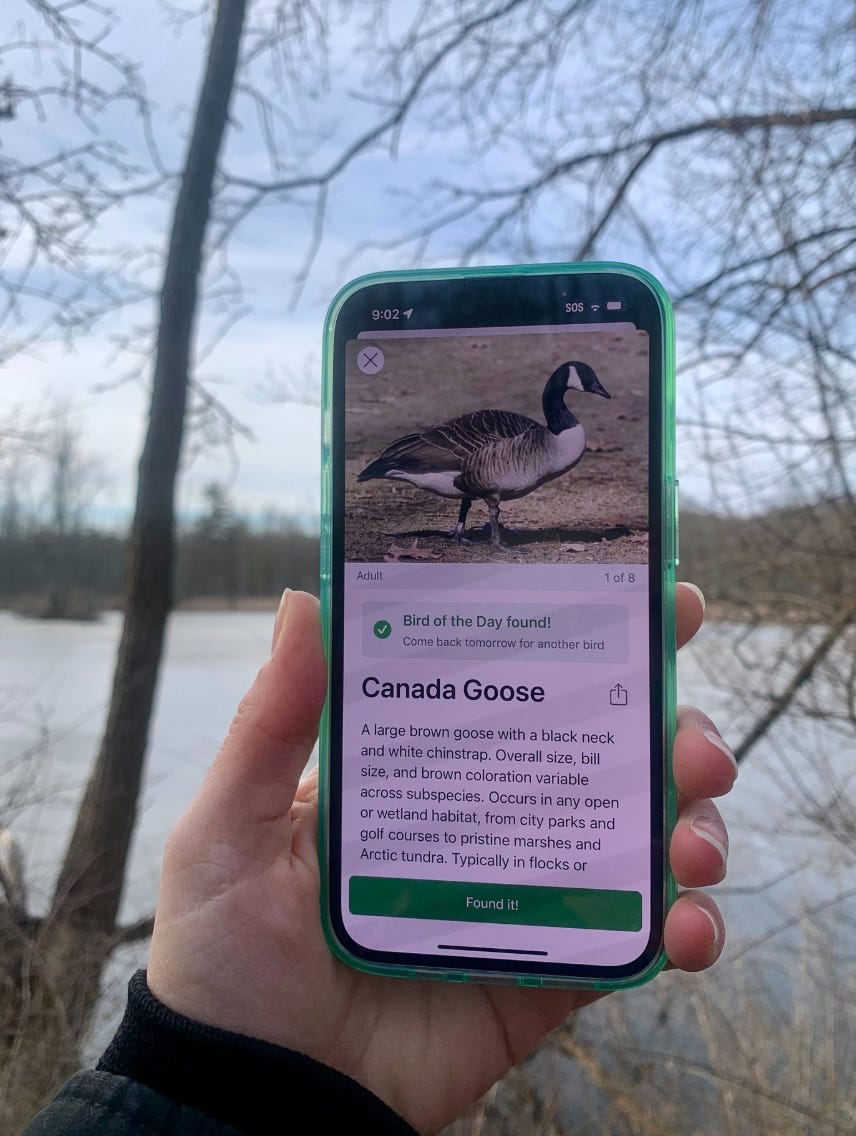"We have faith that Canadians will vote with their knowledge."
The founders of Pollenize created a site that helps voters compare party promises.
Good morning everyone. Late letter today because I went to Game 1 last night and I know you’re probably still catching up on your emails.
Since we’re a week out from the federal election I wanted to bring you an interview with two of the founders of Pollenize, a non-profit that helps young voters compare party promises. Trevor Blades and Miguel Barbosa built the website with four friends in 2014 and have since grown it to serve as a resource for more than 7,000 schools.
Canadians have had a lot to keep up with over the last year and anecdotally I’ve seen people struggling to navigate so much new information. I’m not suggesting Pollenize has the answers, but it’s interesting to talk to people who are bold enough to explore new ways of curating and sharing information (which is what this letter is all about).
Trevor is a software engineer who runs an educational company called Knoword, which helps kids strengthen their vocabulary, and Miguel is a videographer with more than a decade of experience directing and editing commercials and films.
Why did you start Pollenize?
Trevor: During the 2014 Toronto mayoral race we noticed none of the candidates had a clear plan to engage first-time voters, so we put together a team of six of our close friends and built a website that summarized every candidate’s policies in a way that was digestible and visually engaging.
Miguel: Our thesis was that it’s not that people don't like politics, they just don't like the way it's communicated. We can’t catch people up on the lore surrounding these parties that dates back decades and decades, which is also why some people are turned off by politics. It’s like, this is gossip. It’s not useful.
Can you unpack your playbook?
Trevor: We smooth out political jargon, remove anything emotional, and link every piece of information to a source, which is usually a party website, their social media pages, or a news article. We also attach definitions to terms that often come up during campaigns, like rent-controlled housing or the NATO spending target.
Miguel: We don’t write anything new. We pull everything directly from these sources. And in terms of articles, we use policy announcements that have been verified by journalists, not taking talking points or off-hand comments at media scrums. We used to track that quite closely, but now we’re just looking at facts.
What would be an example of that?
Trevor: Candidates lean on extra commentary to try and excite their voting base but for the purpose of educating yourself on a party platform, it’s not helpful. So instead saying Party A wants to remove something because Party B is doing a terrible job, we remove that second part. Candidates also come up with catchy names for campaign promises that don’t mean anything to most people. In 2015, John Tory campaigned on the creation of a “SmartTrack,” so we spelled it out: if elected, John Tory would build a 53-kilometre, 22-stop, $8 billion surface rail line constructed largely on existing GO transit tracks.
How can you afford not to be affiliated with a larger organization?
Trevor: I can tell you a funny story about this. So the 2015 federal election was the first time we achieved some level of mainstream success, and the National Post came knocking and wanted to essentially present the product. They wanted full control, and to change a bunch of things on the site. It was just a non-starter. I think that moment galvanized the group and helped us realize we were not going to be compatible with a mainstream media outlet. Today we work with CIVIX as a research partner. They’re a political education charity that provides curriculum to thousands of schools across Canada, and every federal election they put on a program called the Student Vote. You might remember this from being a young student, but they’ll give teachers the resources they need to get their classes up to date on party platforms and then the students can actually vote on what they’ve learned. I'm quite pleased with where we've settled.
Miguel: They have a budget they work with to use this as an official resource for the Student Vote, so how it works is that they give us the research, Trevor gets it on the site, and we bill them for that time. That’s how we’re able to do this without it completely taking over our lives. But there’s no contract, no guidebook, and we have complete autonomy. I think questions of where we benefit or why we built this for free come from a capitalistic point of view. I feel we're doing our civic duty.
So you’ve never accepted money outside of CIVIX?
Trevor: We have a little link at the bottom of the site where people can donate. Nobody has ever donated, but that's okay.
How are you feeling heading into the final week?
Miguel: We have faith that Canadians are going to vote with their knowledge and not toe the party line. The voting populace here is generally educated and willing to do the research, which is different from how people approach elections in the U.S. As an aside, we did try launching this in the U.S. and it completely bombed.
Trevor: Oh yeah, when we covered our first election in 2015 people seemed to like the tool and find it useful, so we thought, since there was this big election coming up in 2016, that we were going to run the same playbook. Crickets. It just didn’t resonate, and it made me feel quite grateful for the level of political engagement and the willingness to learn and change your mind that exists in Canada. It’s important that we don't take take this for granted.
What’s the end goal here?
Miguel: To see youth voter turnout breaking records. It’s important to note that despite politics becoming more entertainment-driven over the last decade, voter turnout has actually fallen. I think tools like Vote Compass that suggest who you should vote for at the end of a simplified survey don’t give people enough credit. My opinion is that if you’re given all the information, you can reach a conclusion that fits with your own values and truths. Your neighbour could read Pollenize and make a different decision. We’ve been accused of being biased towards every party and I think that’s positive.
And what happens after the election?
Miguel: The Masters Instagram account is inspiring to me because they are so active on social media for like one month every year and they they retreat into the abyss. We just think this is a fun thing to do with our friends every four years.
This conversation is part of a feature called Coffee Chat. In this series, I sit down with cool people doing interesting things and ask them questions that nobody has before.
NEWS:
Home Depot earns more from flowers than appliances, lumber, or paint. The company has reinvented its plant selection process to “maximize your odds of a lush garden garden,” in an effort to keep up its $20 billion a year garden business.
The TTC is hiring a head of communications. This could be a good idea considering the transit agency is struggling to respond to criticism around a campaign that encourages “chance encounters and spontaneous moments” on the TTC, and goes so far as to suggest reframing your morning commute as a dating opportunity. Is that a terrible message? From the TTC, it’s weird. Look at the NYC subway, which is somehow seen as a place where you can get mugged or meet the love of your live, thanks to positive news articles and the StreetHearts dating series (I would also argue @hotdudesreading), all efforts driven by riders.
Uber is being sued for over-charging riders. The Federal Trade Commission lawsuit said that some customers who signed up for a free Uber One trial were automatically charged before their trial ended, which actually happened to me.
Pope Francis regularly met with billionaires to remind them be good people.
People are upset that Hudson’s Bay wants to auction off its historical artifacts. Its collection includes more than 4,400 pieces of art and artifacts, but perhaps the most contentious is the 1670 charter that launched the company and is meaningful to Canada’s history. To be fair there are not many things I wouldn’t sell if I was nearly $1 billion in debt and had just filed for bankruptcy protection.
Oh no birdwatching might be cool. I was recently shut out of a conversation for about ten minutes when the topic shifted to Merlin, an app that helps identify the birds you see and hear, and then saves a list of species you’ve identified. It’s like Pokémon GO only with real animals. From 2020 to 2023, Canadian users rose by 550,000 to 710,000, and the core demographic is (seemingly) trending younger.
Long skirts and brown hair are economic indicators, but so are big pants.
Every year, Qasim Mohammed from Wittington Ventures maps the Canadian digital commerce ecosystem. In case you want to buy Canadian or something.







